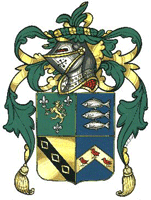|
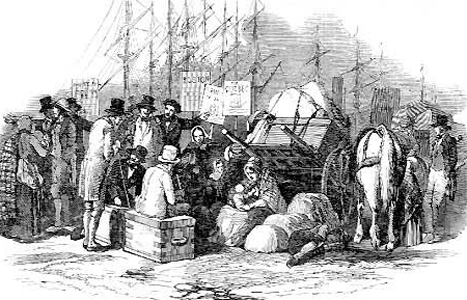 |
| Ready to leave for the
other side of the world |
Adventure and Hardships
Regrettably it has not been possible to find out anything about the
ships that the Trevethans came to New Zealand on, and this remains one
of the major gaps in my knowledge of our family history. However from
other recorded voyages it is possible to gain some insight into the good
times and hardships our forbearers went through to come to New Zealand.
Before departure all the emigrants would have been marshalled on the
poop, and examined by the ship’s doctor as they came down onto the main
deck. Moving down stream to the open sea all the four hundred or so
passengers would be on deck craning their necks to catch a last view of
their friends, whom they were unlikely to ever see again. As they passed
other vessels in the harbour channel there would be cheering and finally
just before they left the main stream for the vast open sea, there would
have been an inspection by the Customs Officers. Only now would they
finally have felt aliens to their own country of old England.
On into the open sea, leaving the familiar land marks, and as the
waterway becomes wider with scarcely any land in sight and the light of
the first day fades, the moon comes up in the sky. There would have been
the great excitement of the unknown and the voyage ahead but also the
deep loneliness at leaving their parents, families and country behind
forever.
The next morning for some, the depression would have set in, and on
board the minister would have comforted those who were so distressed by
their departure. With tears in their eyes many would have wondered if
they had made the correct decision to set out on this voyage to the new
promised land on the other side of the world.
There would have been days with a fair wind when spirits were high
and their vessel moved along at a good pace of fourteen knots and others
when the wind came from the wrong direction allowing the ship to travel
at less than one knot an hour and so make very little progress by the
end of the day. The passage would seem at times like this to be going to
take for ever.
On a fine day the passengers were delighted by the porpoises turning
over and over close to the side of the ship and when the sea was like
glass, so smooth and clear the passengers would fish over the side in
the hope of some fresh food.
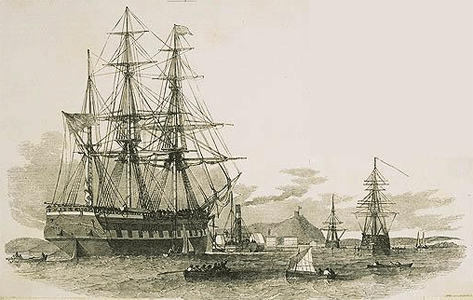 |
| Emigrant ship leaving
for the new world |
Imagine how these normally land-faring people felt to be on a ship
far out in the middle of the ocean for the first time. There would have
been much sickness on board caused by the ship rocking backwards and
forwards in a most uncomfortable and unfamiliar motion. People
complained of sore bones as with the constant rocking of the vessel they
found it to be a continual strain to keep themselves upright. Overcome
with sea sickness some would need to be carried up the ladder from their
beds and then down again. Even men of the strongest constitution would
have succumbed to it, women the same and children sick in all directions
would have been a pitiful site to see with their parents unable to help
them. Another major concern on many ships was lice which seemed to have
infested many people.
As the voyage progressed there would have been storms of the like
that people from the land never visualised happening. The wind must have
raged to a fearful height and whistled through the rigging as the ship
rocked like a cork and raced up and down the troughs of the ocean at
speeds of over fourteen knots. The crew of forty men and boys would have
battled with the sails which would have been filled like a bow ready to
burst with the pressure and cracked with enough force to split them. On
occasions the wind would have been so strong that one sailor would have
been unable to manage the wheel by himself and had to have help. Many
must have feared for their lives and wished that they had never set out
on this voyage.
At times the ship would have given a mighty heave and all on board
must have thought that their vessel was going over onto her side. The
women would have screamed and the children must have been very
frightened. Imagine the galley where the tea for all four hundred
passengers ended up on the deck, mixed together and running out of the
cook house across the open deck and down into the sea. Down below all
their possessions would have been on the floor, flung from their places
on the shelves.
Passengers were often very frightened as on some days they could
hardly see across the deck as the rain was so thick and the sky so
fearful and black. Down below at times like this it would be nearly
completely dark as the hatches would be closed and sealed with an oil
cover put on them to keep the horrid sea out. Even then water would find
its way through all the caulking and need to be continuously mopped up
to stop all their belongings becoming wet. They would be able to hear
the rain falling very heavily on the deck.
At times they thought their ship was going to capsize when they and
their belongings were thrown to the deck, all sprawling on the floor
together with the women screaming and the children being frightened. In
fact one account recorded that the floor was like a “general shop”
containing all sorts of things, with their water bottles emptied and
some slop pails that were tired of carrying their burden emptying
themselves amongst the debris.
Some mornings the sea was really awful with the waves rising very
high and falling on deck with a heavy thud. It would have been very cold
and some emigrants felt that they were nearly starved out with cold and
hunger, as even when they were able to get their stores out they had
great difficulty in getting it cooked, the cooking galley being about
half big enough for the amount of people, and with only one cook.
The passengers must have experienced many bleak days as there are
accounts of icebergs, and of snow falling on the decks thick and fast.
Records talk of ships with two inches of snow over their deck and
children and adults alike collecting snow to throw at each other.
The rations were served out to the passengers every few days and it
seems from all accounts that there was never enough due mainly to the
poor allowance provided for children nearing adulthood. The diet
consisted of about four ounces of preserved meat for each adult and
three potatoes, but two children under twelve years had only the same as
one adult (one and a half potatoes and 2 ounces of meat). The result was
that families of six children and two adults did not have enough food.
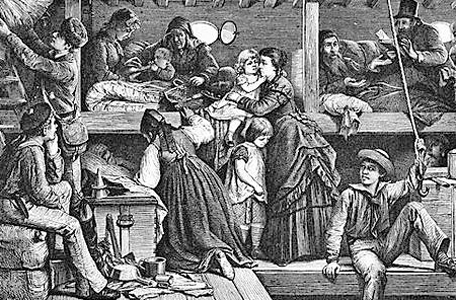 |
| Between decks on an
emigrant ship |
Boys who at home eat as much as a man each day, had to make do with
two hard biscuits, three and a half ounces of bread and four ounces of
meat on the bone (about two ounces after cooking), rice or oatmeal,
twelve ounces per week and of course there was tea or coffee.
Some wished they had not come on the voyage not because of the
hardship of the voyage but because of the diet, of which they found
there was not enough of some things and very inferior quality of others.
Many wished that they had bought flour, sugar and tinned milk with them.
Most ships carried a small amount of live stock on board to
supplement the diet for the Captain and officers. Typically there would
be on board ten sheep, ten pigs, about thirty ducks and thirty hens.
In the galley there was an oven in which bread was baked three times
a week but there was never sufficient of it. On occasions the cook would
prepare a large pan of porridge with oatmeal.
Some of the passengers had spare food they had bought with them and one
account related that one passenger sold half a large cheese at two
shillings and six pence per pound making a very handsome profit. Very
high prices would have been paid for such things as tinned meats,
cheese, hams, eggs, jams, German sausage, tinned fish, milk and lump
sugar as none of these items could be obtained on board for love nor
money.
On Sunday mornings all the passengers would have dressed in their
best clothes and assembled on deck for their church service. The service
would have been taken by a minister if there was one on board or maybe
the ship’s Doctor. There was sure to have been a choir of young ladies
to lead the singing.
The captain may have made a practice each Sunday of writing, as some
did, the ship’s position on a blackboard at noon so the passengers could
see the progress of the past week. One Captain made it his practice on
Sundays of giving all the children a little amusement by throwing nuts,
raisins, figs and sweets from the poop of the ship making the children
have to scramble for them. It was an amusement they greatly looked
forward to.
Every few weeks the day was spent taking the passengers’ boxes up
from the ship’s hold, so that they could take out what ever they wanted
before returning them to the hold not to be seen for another month.
On occasions other ships were sighted coming and going from the new
colonies and if they were very lucky, another vessel would come
alongside and exchange news or take off a bag of mail for those left
behind in England.
There would have been a school established on board for the eighty or
so children which the parents would have considered a blessing, making
it possible to rid themselves of the children for a little time each
day. The accumulation of so many children all together in such a small
area would have been enough to make their heads ache. Teaching of the
children would have been on fine days in a sheltered spot just under the
poop with separate classes for boys and girls. With the large number of
children, a good number of teachers would have been needed.
There would have always been entertainment on suitable evenings. Some
nights, dancing on the main deck and on other occasions concerts put on
by the passengers. The concerts for single girls were separate as they
were not allowed to intermix with the rest of the passengers and were
normally housed on the poop. Music was provided by violin, banjo, cornet
and double bass.
On one voyage a concert was held with seven people chosen to sing
after the style of the Christy Minstrels. All wore wigs, clean white
shirts and had their faces blackened to make them look like Negroes.
They sang to an orchestra of fiddles, banjo, double bass and piccolo
which were conducted by a conductor complete with his baton. A lot of
trouble was taken to decorate the deck of the poop with ship’s lamps and
union jacks, and other coloured calico. All the seating forms were
covered with red cloth.
Accounts of the voyages I have read mention the many deaths on board
these emigrant ships, particularly those of the very young children. The
first death of any voyage seemed to throw a gloom over the entire ship
which could last for days. In preparation for a funeral the chief mate
and ships carpenter would bring a canvas bag on deck and in the bottom
of it place twenty pound of iron. They would then take the child, put it
in the bag, sew it up and place it on the coffin board at the side of
the ship ready for the burial. The Passengers would assemble on deck to
witness the commitment of the dead child to the sea. The funeral service
was read by the minister if there was one on board, or maybe the ships’
doctor or the captain. The ship’s large bell on the forecastle was
tolled and after the reading the captain would glance at the chief mate
who would send the corpse gently sliding down a piece of board out of
sight and into the sea. Nobody could fail to hear the splash as the
child hit the water, and at that moment the shriek of the mother as her
child was sent to a lonely and watery grave.
All kinds of calamities overtook the passengers on these vessels. On
days when the wind was raging and the vessels were very unsteady,
accidents were very common. In one account, a woman was walking on deck
and had her head thrown against some timber and cut it very badly,
another girl was coming down the stairs and fell to the bottom hurting
her arm and back, and on yet another occasion a man with a young baby
fell down the companionway badly hurting the child. One sailor up in the
rigging accidentally let his knife fall and it very nearly fell on a
man’s head on the deck, but instead cut his coat lapel!
Fatal accidents as a result of sailors falling from the mast head
were commonplace. On one ship a sailor was furling the third bottom sail
on the gibbon and fell onto the main deck a distance of fifty feet. He
was taken below quite insensible with a number of broken bones and the
spine of his back critically injured. He did not live till the next
morning.
Most voyages recorded a few births as well and these were a time of
great joy for all and in a small part made up for the tragedy of the
many deaths. Some of the births however also turned to tragedy as after
days of difficult labour and suffering in difficult conditions the child
would be born dead, or the new mother would die.
Practical jokes have been played at sea since time began and in one
account the young single girls, hearing that they were today crossing
the line of the equator, asked the Captain if they could use his
telescope to see this event. Naturally the Captain obliged but the girls
were unable to see the line. The Captain had a further look and said he
could see the line plainly and couldn’t understand why the girls were
unable to see it!
On most nights the passengers were in bed as early as eight as by
then it was well dark, but it did make for very long nights. Many slept
with no clothes on as it was often very hot below decks. To preserve
modesty each bed was screened by a curtain in front of it so that it was
entirely shut in from
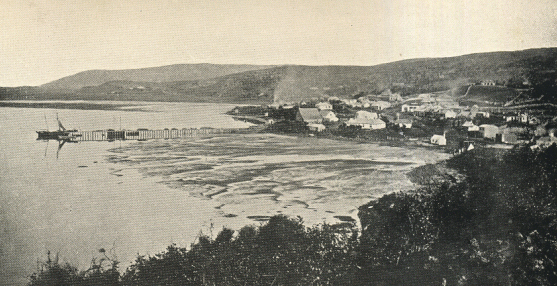 |
| Dunedin 1852 |
the gaze of others. The beds for married couples
were about three foot six inches wide, six feet long and two feet high
with a long locker in front to put their belongings in. The height
between decks was seven foot six and there was a shelf overhead. Single
girls slept in a separate part of the ship and only allowed to visit
their mothers every few weeks. Early in the evening the bell would be
rung when it was time for the single women to go to bed. Every night
there were watchmen chosen from among the passengers to stand four hour
watches throughout the night in case any of the sick required
assistance.
As voyages near their end, one reads of passengers rejoicing at the
end of the journey being near as they were all heartily sick of the
confinement of the ship and its continuous motion. Some express the view
that they will soon be saying goodbye to the sea and that once on dry
land they shall say good bye to the sea forever, as they will never
again go in an emigrant ship.
As their destination was close at hand, with only a few more days to
go, there were hopes that they would soon see a New Zealand Government
steamer bringing fresh stores to their ship. There were worries also
that whether their ship would be found healthy enough to be able to set
their passengers at liberty in the new land, or whether they would be
kept in quarantine. As land approaches everybody is busy with extra
cleaning, taking all their bedding out and scrubbing out the berths.
Every nook and cranny is cleaned out and scrubbed under the watchful eye
of the constable whose duty it is to ensure that the ship is not placed
in quarantine on arrival.
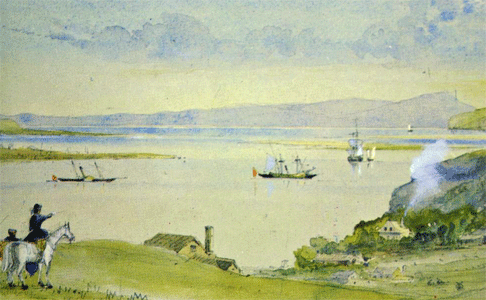 |
| Otago Harbour looking
towards Dunedin mid 1800's |
Imagine the excitement on board as they rounded Stewart Island at the
south of New Zealand and started their way up the east coast to the Port
of Otago only a short distance away and finally journey’s end. What must
it have been like then to have experienced unfavourable winds and delay
making their final land fall? Everybody would be down in the dumps as
one day’s sailing became two days or even a week, and each day thinking
today would be the day they would land after three long months at sea.
As the mist cleared on each new day they would be able to see the
outline of the hills very plainly which would have put fresh life into
them. As they finally approached the harbour they would be able to see
the chalk looking rocks, yellow faced hills and in place bush down to
the sea. Settlers’ cottages would be able to be seen dotted here and
there, along with their cattle in front of the background of mountains
still capped with snow.
When time came to finally drop anchor and the steamer came alongside,
the excitement must have been almost too much. On board would have come
the government officers to check on the health of the new arrivals and
no doubt fresh supplies of beef, mutton, potatoes, vegetables and new
bread all from their new land. While waiting to be allowed to disembark,
their first meal in New Zealand would no doubt be judged the best they
had had since leaving England all those months before. And so the
emigrants from the other side of the world became New Zealanders and start
their new life.
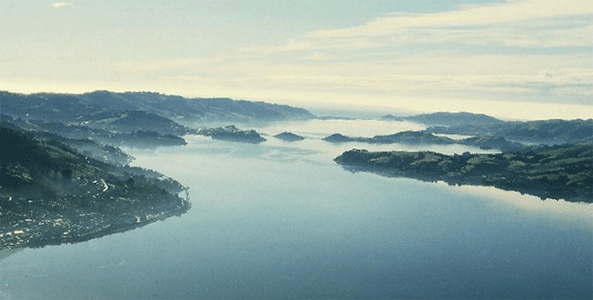 |
| Otago Harbour today
looking out to sea |
|
